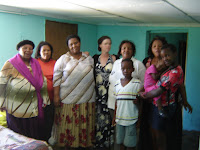The month of December slows down where jobs and work are concerned, but family life and socializing bustles with the holiday spirit.
Basotho have been saving their money for months, and they spend everything they have over Christmas.
The men gather at the shebeens to drink beers all day and night.
The women prepare and cook obscene amounts of food while gossiping in the kitchen.
Most women get their hair done as well for the holidays.
Hairstyles vary from simple cornrows to elaborate w

eaves.
My PCV friend Akoua and I have been talking about going to the hair saloon (yes, they say saloon) for a few months now, so we decided to join all the Basotho women in getting our hair done for Christmas (or as Missy Elliott says… “Got my hair did.”).
We walked to an obscure building in the taxi-rank in
Maseru that housed a few dozen shops and hair salons on the second floor.
Women in plastic lawn chairs with half-braided heads crowded the long, winding corridor.
The process of getting my hair braided was a cultural experience in itself.
I got “singles” with extensions.
Unbeknownst to me, singles take a very long time to braid (see photo).
I sat in my own plastic lawn chair for 4 days letting half a dozen women tug and pull at my hair while I watched other Basotho women get different hairstyles.
The way some of the hair is done is fascinating—the “Judy” requires a spiral cornrow all around the head, and then cute little red and black corkscrews of fake hair are sewn into the braids.
My scalp hurt during and after the braiding process (not for too long), but it feels fine now—just a little itchy.
The Basotho love it.
I have gotten a ton of compliments and excited looks.
Even in
Durban, a handful of black South Africans admired and commented on my braids.
I especially liked returning to my village in Qacha’s Nek where all the women also had been recently braided for Christmas.
I stayed in
Lesotho for Christmas this year (my last chance).
My best friend Nozipho invited me to join her family on Christmas Day.
It was fairly low-key.
Some of us exchanged gifts, and there was a feast, or
mokete, with meat.
It was a nice Basotho family Christmas with all of Nozipho’s extended family who traveled from all over
Lesotho to be together in Qacha for the holidays.
The day after Christmas is also a holiday, Boxing Day.
Nozipho’s family had another feast for Lehle, a little cousin who just finished pre-school.
A sheep was slaughtered for him, and many drinks were imbibed.
The party roared into the night with more drinks and a second meal at

10pm, a braai (or BBQ) of sausage and papa.
Everyone danced all night to house, hip-hop, and traditional music.
And when I say everyone, I mean everyone—aunts, uncles, grandma, little cousins, and big cousins all danced the night away.
I finally went home with some neighbors of mine at 1am, although most of the family was still awake and drinking.
Then on the 27
th, there was another party for Nozipho’s daughter, Litsitso.
Another feast, more drinks.
I left this party early though.
I was still tired from the night before and couldn’t stop yawning.
I had a great time with Nozipho’s family although I still missed my own in
California.
For the New Year, I traveled to
Durban for a short holiday on the beach.
I had a good time—mostly alone time on the beach during the day, and clubs at night with the other 2 dozen PCVs in
Durban for the holiday.
It felt amazing to put a bikini on and hit the beach… in December!
I hope all of you had a wonderful holiday.
Best wishes for 2009.
Happy New Year!
 eaves. My PCV friend Akoua and I have been talking about going to the hair saloon (yes, they say saloon) for a few months now, so we decided to join all the Basotho women in getting our hair done for Christmas (or as Missy Elliott says… “Got my hair did.”). We walked to an obscure building in the taxi-rank in
eaves. My PCV friend Akoua and I have been talking about going to the hair saloon (yes, they say saloon) for a few months now, so we decided to join all the Basotho women in getting our hair done for Christmas (or as Missy Elliott says… “Got my hair did.”). We walked to an obscure building in the taxi-rank in  10pm, a braai (or BBQ) of sausage and papa. Everyone danced all night to house, hip-hop, and traditional music. And when I say everyone, I mean everyone—aunts, uncles, grandma, little cousins, and big cousins all danced the night away. I finally went home with some neighbors of mine at 1am, although most of the family was still awake and drinking.
10pm, a braai (or BBQ) of sausage and papa. Everyone danced all night to house, hip-hop, and traditional music. And when I say everyone, I mean everyone—aunts, uncles, grandma, little cousins, and big cousins all danced the night away. I finally went home with some neighbors of mine at 1am, although most of the family was still awake and drinking.



